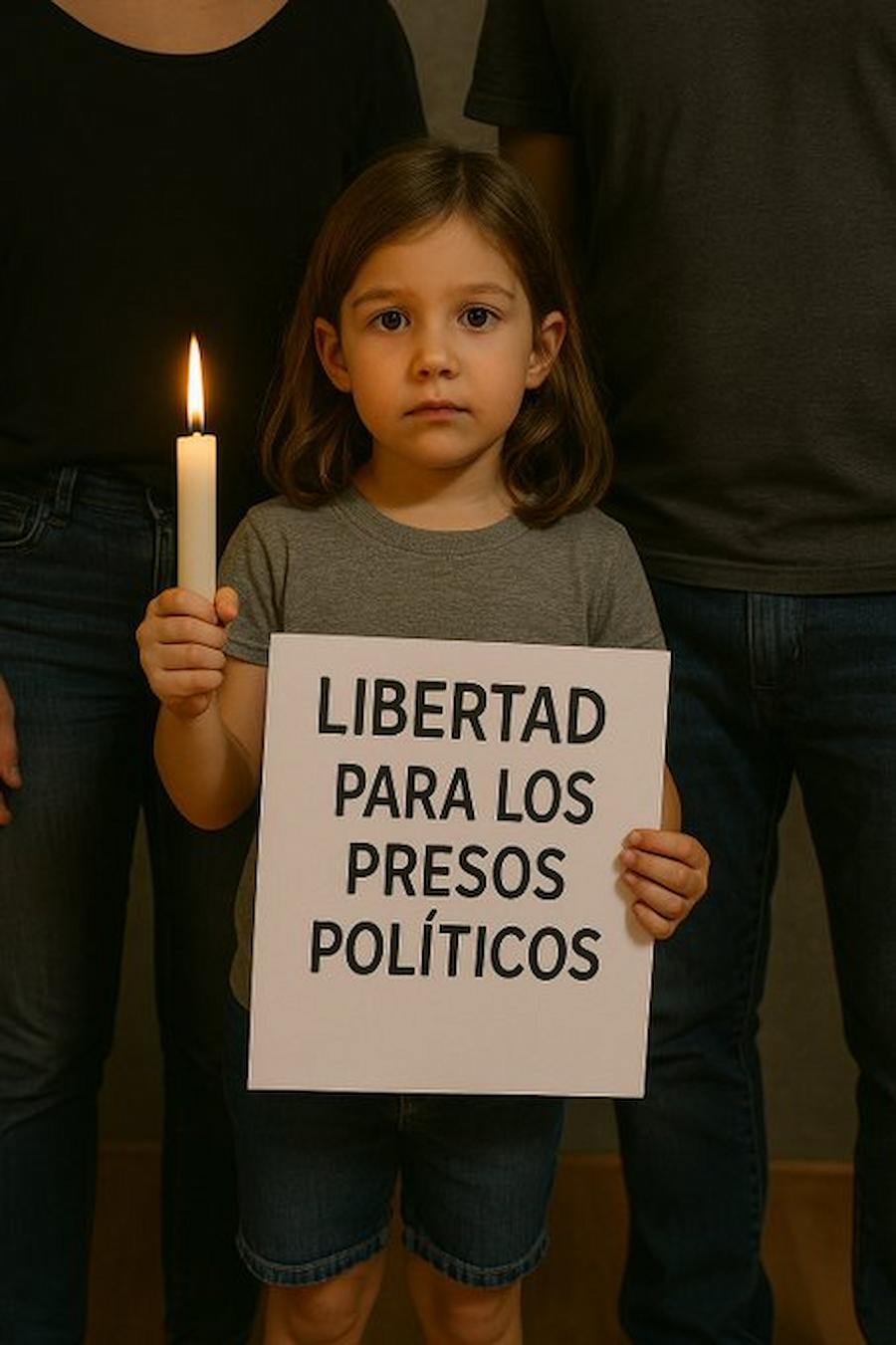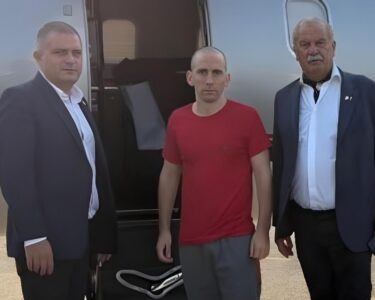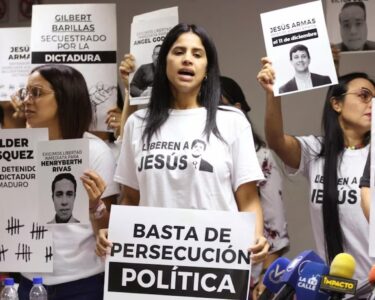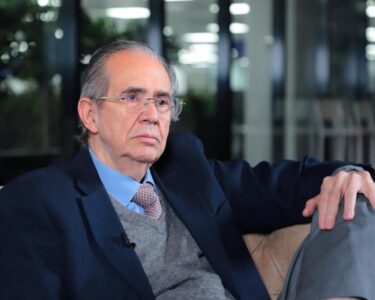“In a country of storms and silence, the vanished leave empty chairs, unanswered prayers, and a fear that corrodes every home.”
On a night of torrential rain in Caracas, the knock came just after midnight. Outside, the downpour hammered the tin roofs and turned the streets into rivers, but inside the house the only sound that mattered was the pounding at the door. Masked men stormed in, shouting, shoving, breaking furniture. When they left, they carried away the eldest son. No warrant, no explanation—only silence and fear left behind.
His mother still sets a plate for him at the table, clinging to the ritual as if it might summon him back. “The silence is the worst torture,” she whispers. “You don’t know if he is alive, if he is suffering, or if you will ever see him again.”
Her story is not unique. Across Venezuela, families live in the shadow of forced disappearance and arbitrary detention. Human rights groups report more than 875 political prisoners, with at least 61 people whose whereabouts are unknown. Doctors, teachers, student leaders, and military officers are among those swept up in raids. Some are accused of “treason,” others of vague crimes against the state. Many are never formally charged.
The government of Nicolás Maduro insists there are no political prisoners, only criminals. Yet the testimonies of families, lawyers, and survivors tell a different story—one of repression, cruelty, and a society living in fear of the midnight knock.
A Machinery of Fear
The mechanics of repression are chillingly consistent. Agents in balaclavas arrive in unmarked vehicles. They seize not only activists but also relatives who try to resist. Homes are ransacked, belongings destroyed. Those taken vanish into a network of clandestine detention centers. Families are left to wander from police stations to military barracks, begging for information. Often, they are met with denial: “No one by that name is here.”
According to Foro Penal, a Venezuelan NGO that has tracked detentions for over a decade, there are currently 875 political prisoners. Among them are 173 military officers, 112 women, and even four adolescents. More than 60 people are officially “disappeared”—their whereabouts unknown, their families left in limbo. Since 2014, Foro Penal has documented over 18,500 politically motivated arrests. The scale is staggering, but the statistics only hint at the human cost.
The Disappeared
Disappearances deepen the cruelty. Families are condemned to uncertainty, unable to grieve or to hope. In Maracaibo, a teacher was taken after criticizing the government on social media. His wife has spent weeks traveling through flooded streets and storm‑darkened highways, clutching a folder of documents and photographs. “Everywhere I go, they tell me he isn’t there,” she says. “But I know he is somewhere. I just don’t know where.”
The disappeared are not officially acknowledged. They exist in a legal limbo—neither alive nor dead in the eyes of the state. Their names circulate on social media, their faces printed on posters at protests. But without official recognition, they are ghosts in their own country.
Torture as Policy
Former detainees describe a grim repertoire of abuse: beatings, electric shocks, suffocation, prolonged isolation. Some recount being forced to record false confessions. Others speak of psychological torture—threats against their families, staged executions, deprivation of sleep and food. “They wanted me to sign a paper saying I was a terrorist,” recalls a young activist released after months in custody. “When I refused, they beat me until I couldn’t stand.”
International organizations have documented these practices. The United Nations has accused Venezuelan security forces of crimes against humanity, citing evidence of systematic torture. Yet inside the country, accountability is nonexistent. Prosecutors dismiss allegations, and judges rubber‑stamp detentions. The machinery of repression grinds on.
The Role of “Social Intelligence”
The repression is fueled by a climate of surveillance. Citizens are encouraged to denounce neighbors through mobile apps, echoing the infamous “operación tun‑tun,” when security forces would knock on doors in the night. Community leaders, once trusted figures, now act as informants. The result is a society where suspicion corrodes solidarity. “You don’t know who to trust,” says a university student in Valencia. “A neighbor can accuse you, and that is enough to disappear.”
Families in Limbo
For families, the suffering is relentless. Mothers sleep on sidewalks outside detention centers, hoping for a glimpse of their children. Wives pawn jewelry to pay lawyers who may never secure a hearing. Children grow up with empty chairs at the table. “It is not only the prisoner who suffers,” explains a lawyer with Foro Penal. “It is the entire family, condemned to uncertainty.”
The cruelty is compounded by the government’s denial. Maduro and his officials insist there are no political prisoners, only criminals. State media portrays detainees as traitors or terrorists. Families who speak out risk harassment, job loss, or arrest themselves. Silence becomes a survival strategy.
A History of Repression
The current wave of detentions is not without precedent. Venezuela has a long history of political imprisonment, from the dictatorship of Marcos Pérez Jiménez in the 1950s to the turbulent years of the 1980s and 1990s. But the scale and systematization under Maduro are unprecedented. Since the contested presidential elections of 2024, arrests have surged. The government’s reliance on “social intelligence” networks recalls the neighborhood committees of Cuba or the secret police of the Southern Cone dictatorships. For many Venezuelans, the echoes of Latin America’s darkest decades are unmistakable.
International Response
International organizations have received detailed lists of detainees, but global pressure has yet to secure systemic change. The United Nations and the Organization of American States known that the machinery of repression continues. Occasional prisoner releases are framed as goodwill gestures, but they are often offset by new arrests. The cycle is endless: a handful freed, dozens more detained.
The Venezuelan diaspora has taken up the cause. In Madrid, Miami, and Bogotá, exiles organize vigils and protests, holding up photographs of the disappeared. Social media campaigns amplify their voices, but inside Venezuela, the risks of speaking out remain high. “We are their echo,” says a young activist in Spain. “If we don’t speak, they vanish twice.”
Scenes of Resistance
Despite the risks, resistance persists. In Caracas, families gather in plazas for candlelight vigils, even as rain pours down and police patrol nearby. At the same time, in Mérida, students paint murals of the disappeared, only to see them whitewashed overnight. In Barquisimeto, priests read the names of prisoners during Mass, defying government warnings. These acts may seem small, but in a climate of fear, they are acts of courage.
The Numbers Behind the Pain
- 875 political prisoners documented by Foro Penal
- 173 military officers among the detained
- 112 women and 4 adolescents currently imprisoned
- 61 disappeared, with no official record of their location
- 18,565 arrests since 2014 for political reasons
Behind each statistic is a family like María’s, living in limbo.
Denial does not Erase Absence
The Maduro government may deny the existence of political prisoners, but denial does not erase absence. The empty chairs at family tables, the unanswered knocks at prison gates, the whispered prayers of mothers standing in the rain—all testify to a reality that statistics alone cannot capture. Venezuela has become a country where silence is weaponized, where fear is policy, and where the storm outside mirrors the storm within.
The world may debate numbers and definitions, but inside Venezuela, the truth is written in anguish: a nation where freedom is measured not by rights, but by the absence of those who dared to claim them.







1 Comment